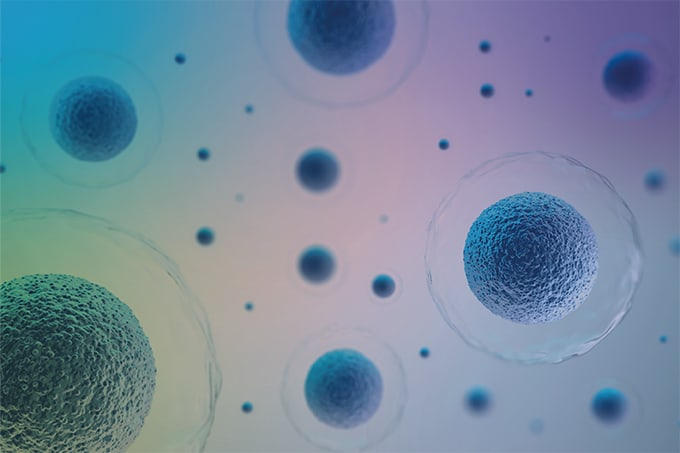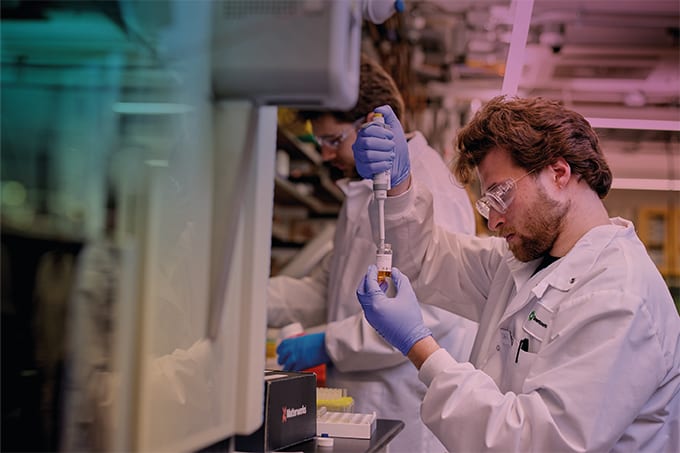What is a cloud lab?
A cloud lab is a semi-automated, centralized, and secure research laboratory where scientists can remotely run experiments from beginning to end through a single user-friendly software interface. A cloud lab contains all the instrumentation and functionality needed to allow scientists to execute any experiment they could run in a traditional lab environment. After initial training and with secure access to the platform, new users can send in any custom samples and order reagents or materials from vendors that are not already found in Emerald Cloud Lab’s (ECL) on-site inventory. They can then design and submit their protocols through ECL’s Command Center software application and the lab runs their experiments precisely as prescribed. Scientists on the system can run multiple experiments in parallel, with the facility operating 24/7/365.
What primary challenges are cloud labs trying to address?
Cloud labs are ultimately designed to free scientists from the time, financial, and physical limitations of running a laboratory, allowing them to better orchestrate their science by devoting more energy to designing new experiments, interpreting data, and developing new and novel insights. A recent survey by Agilent – discussed by Darlene Solomon in another article in this series – found that most lab managers feel limited by the day-to-day challenges of running a laboratory. For example, a scientist can experience significant downtime by constantly performing instrument maintenance, preparing samples, ordering supplies, and hiring/training technicians. Furthermore, acquiring or arranging access to the instrumentation needed to perform an experiment in a traditional lab could take months. In contrast, it takes on average five hours to get any experiment up and running on the ECL.
How does Emerald Cloud Lab differ from other cloud labs, CROs, and laboratory automation tools/services?
Emerald Cloud Lab is the only true cloud lab in the sense that scientists are able to run all of their experiments in the cloud, rendering the physical laboratory redundant. When we originally coined the term “cloud lab” back in 2011 and envisioned what this new technology would be, we developed five criteria.
- Scientists should be able to remotely conduct experiments on-demand, 24/7/365 via a computer interface without ever setting foot in the facility at any point (or communicating with a human consultant via oral or written conversation).
- Fully customizable experimentation should be available, offering the same flexibility remotely as scientists would have if they were in a real lab.
- There should be enough instrumentation to cover the full scope of laboratory work in traditional labs, obviating the need to split protocols between remote and local facilities or automated and manual procedures. To credibly cover most life science R&D, the lab must have more than 150 different types of instruments available online – anything less remains a partial solution.
- Users should be able to customize and conduct all aspects of sample preparation remotely, including (but not limited to) liquid handling at any scale (microliters to liters), solid handling at any scale (micrograms to kilograms), and storing samples indefinitely between experiments in the standard set of storage conditions available in a traditional laboratory.
- Users should have access to baseline software for scripting experiments and visualizing and interpreting all of the data generated – without requiring additional access to third-party software or custom engineering/coding of new instrument interfaces.
Emerald Cloud Lab embodies these five criteria, differentiating it from other companies. We give our clients the ability to run their entire experiment workflows in our platform, which cannot be done with other services. Furthermore, our platform differs from CROs because it both enables scientists to get up and running immediately and allows them to retain complete control over their experimental protocols, data, and analysis.
What role does artificial intelligence play in the service you provide?
Artificial intelligence (AI) has shown remarkable promise to revolutionize the life science industry by improving decision-making from early discovery to clinical research. There are two ways we’ve seen AI play a role in cloud labs to date. First, AI within ECL’s software streamlines operations by ensuring experiments are run exactly how the scientist would conduct it themselves and in a fully reproducible manner.
The second AI application in cloud labs is for data analysis. Organizations are using AI to evaluate data generated on the ECL and to predict the outcomes of future experiments, increasing the probability of success for future work. An early adopter and pioneer of this approach is Christopher Landmead, whose recent paper demonstrated the “world’s first algorithm for closed-loop optimization in cloud laboratories.” Rather than defining what experimental parameters to use in an experiment, his team specifies the desired outcome and then uses different algorithms (including a novel one of his own design) to automate multiple rounds of experimental design. This use case is only possible in an environment like the cloud lab, where the specification of the experiment is fully expressed and the quality of the resulting data is comprehensive and consistent enough to provide a foundation on which to build and optimize these algorithms.
How do you manage data and biosecurity at your cloud lab?
As far as data security goes, Emerald Cloud Lab stores all production data in Amazon Web Services (AWS) encrypted with industry-standard AES256 encryption. Additionally, data exchanged between ECL servers and our Command Center desktop application, as well as data exchanged between ECL internal systems, travels encrypted via HTTPS/TLS or SSL connections. We control who has access to run experiments in the lab and track this by assigning unique user ids for all customers on the system. Physical access is also restricted to ECL employees.
Cloud labs offer a great opportunity to improve biosecurity over a traditional lab environment, as traditional labs, distributed across the world and using disparate means of storing data, don’t offer a way to audit what happened in the lab. Our team doesn’t know what our clients are working on, but the ECL has a wide-ranging series of checks that it continuously runs to ensure that nothing dangerous or illegal takes place in the ECL. Our software tracks and stores every chemical, consumable, action, process, and result that takes place in the facility, so although we are extremely sensitive to our customer’s privacy, we have a duty to ensure that the lab isn’t being used irresponsibly.
How do you see the role of cloud labs in life science research 10 years from now?
Our goal with ECL in the coming decade is to accelerate the rate of scientific advancement and progress by providing better, faster and cheaper access to necessary tools and instrumentation. The combination of increasing the velocity, leverage, and accessibility of science will allow a more diverse group of scientists to do more in critical fields like pharmaceuticals, materials, and agriculture. For now, the cloud lab concept is still new and adoption is still growing. We are determined to build relationships and trust with our fellow scientists step-by-step by “showing, not just telling” the larger scientific community how this technology can empower them and allow them to move farther, faster.
What do you imagine the cloud lab of 2050 will look like?
There are several ways that cloud labs are transforming science today (i.e., democratizing access to scientific equipment, increasing the velocity of research, etc.) but we think that our users will discover how it can drastically shift how research is conducted. Some clients have used ECL to build and automate entire workflows on the system, on both the physical and data side, without needing to bring in automation engineers or their IT departments.
Another big area of opportunity leverages the structured data sets coming out of a cloud lab. Given that everything is recorded and neatly organized in a cloud lab, data scientists can access, analyze, and build models on the data without spending excessive time finding, cleaning, and linking that data. We are particularly excited about our partnership with Carnegie Mellon University, USA, where Rebecca Doerge, Dean of the Mellon College of Science, is using cloud lab technology to close the divide between physical and data sciences.
With the advantages inherent in cloud labs over traditional research environments, the breadth and utilization of cloud labs will drastically increase over the coming years.




